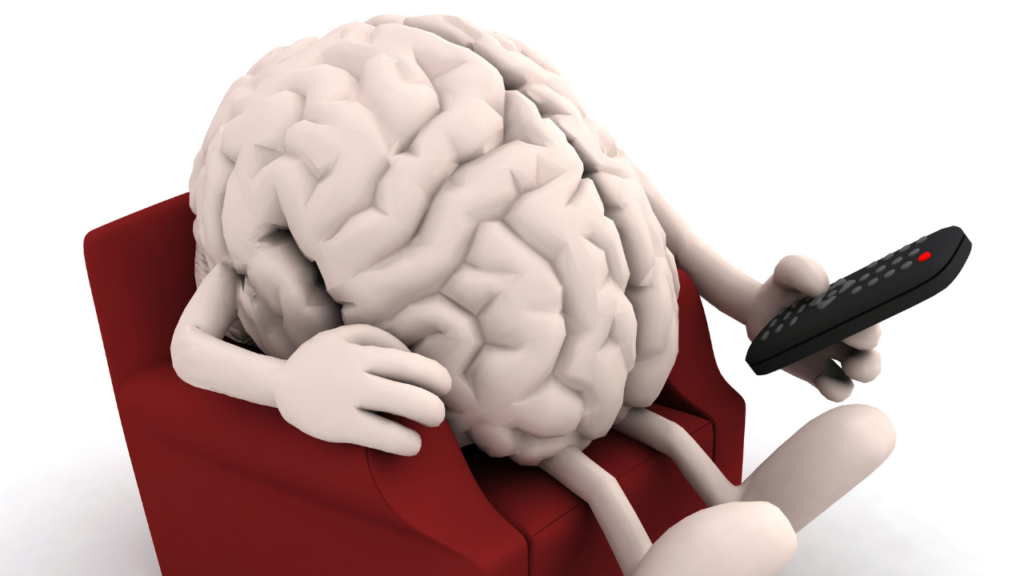Hello, you Cool Cats! Welcome back to the Brain and Obesity series. Here’s Part 4, all about the lazy modern brain! Why and how is the modern brain lazy? And what do I mean it gets fatigued easily?
We have discussed the old man primal brain and touched on the modern brain – the teenager riding shotgun to the primal brain. In case you’ve missed them, I suggest checking out Part 1, Part 2, or Part 3 to get the full primer on all things the brain we have discussed thus far! Now it is time for an in-depth look at how your modern brain is lazy and easily fatigued like a teenager.
The Path of Least Resistance
 First things first, in terms of laziness, our modern brain always wants to find the path of least resistance. Meaning: What is the least amount of work I can put in to get my desired outcome? Can I ask my mom to bring me a snack from the kitchen vs. walking there myself? Or, is there a way to continue lying on my parents’ couch and make money? Work smarter, not harder, you might say. But is that really the case?
First things first, in terms of laziness, our modern brain always wants to find the path of least resistance. Meaning: What is the least amount of work I can put in to get my desired outcome? Can I ask my mom to bring me a snack from the kitchen vs. walking there myself? Or, is there a way to continue lying on my parents’ couch and make money? Work smarter, not harder, you might say. But is that really the case?
Let me give you an example:
It is the end of the workday. You just got home and discovered your spawn that has been lying on the couch all day forgot to take the chicken out of the freezer for dinner. (I cannot count the number of times my brother and I did this to our poor mother. Sorry, mom.) Now you’ve got to make a new game plan while trying to figure out how to get away with murder as your spawn whines about how hungry they are. If you are anything like my mother, you have watched enough CSI episodes to know how to make someone drop off the planet as if nothing happened.
Anyway, you check the fridge. Any leftovers or viable options were consumed by the teenager earlier, and of course, the empty dishes are left in the sink, not even rinsed and less than 1 foot from the dishwasher. (Again, why do people have children?) Ok, we could go to the grocery store to grab something, but eff that, it’s already 6:30 pm.
What about Instacart? They could bring chicken directly to your door, along with 100 garbage bags, lye, and some bleach. Sounds pretty good. BUT that will be 30-60 mins, then you gotta cook the meal and dispose of a body. On the other hand, Skip the Dishes can have a pizza at your door in 20 mins. Oh hey, if you add a chocolate brownie to your order, the delivery fee gets waived. F*ck ya, I deserve a damn chocolate brownie. DONE! Order that pizza.
Now, the example above probably took you 30-60 seconds to read, but the scenario happens within seconds inside your brain. Going to the grocery store would have been the ideal option, but it also required the most work. And you are hungry, so your primal brain is screaming at you for food and your teenager modern brain is tired, stressed, cranky, and requiring a safe space, so let’s be real a pizza and a brownie sound way effing better and easier than leaving the house again to get chicken. Our brain will always default to the path of least resistance – I mean, look at all the apps and other forms of technology we have developed to make our lives easier and more convenient?!
Creating Habits
 Secondly, your modern brain creates habits. Now habits are absolutely vital to our survival and existence, but the wrong habits can also be detrimental. They are important because they allow us to solve a recurring problem in our lives quickly and automatically. If you had to think about how to drive your car, brush your teeth or wash your hair every time you engage in those behaviours, you would be exhausted before the day even started. The creation of habits allows our brain to offload remedial tasks so it can focus on the next more complex problem, such as where you can obtain Hydrofluoric Acid for the purposes of dissolving mammalian tissues. (As Breaking Bad showed us – do not put those tissues and acid in a bathtub.)
Secondly, your modern brain creates habits. Now habits are absolutely vital to our survival and existence, but the wrong habits can also be detrimental. They are important because they allow us to solve a recurring problem in our lives quickly and automatically. If you had to think about how to drive your car, brush your teeth or wash your hair every time you engage in those behaviours, you would be exhausted before the day even started. The creation of habits allows our brain to offload remedial tasks so it can focus on the next more complex problem, such as where you can obtain Hydrofluoric Acid for the purposes of dissolving mammalian tissues. (As Breaking Bad showed us – do not put those tissues and acid in a bathtub.)
One of the issues is that the habits you create might not always be the most effective. I never say there are good or bad habits. There are just effective and ineffective habits. Every single habit or pattern you have developed solves a problem. For example, if you go for a run to feel better every time you are stressed out, this would be an effective habit. However, if you binge on three chocolate bars every time you are stressed to feel better, this would be an ineffective habit. In both situations, your problem – the stress is resolved. Running might be better for your overall health in the long term – as long as you are not literally running away from your problems.
Once your brain creates a habit or behaviour, it is challenging to break a habit and/or create a new pattern. Not impossible, just hard AF. That is because your brain is a hedonist, and every time it receives the reward of feeling better (from running or chocolate), it gets a hit of dopamine, reinforcing the behaviour. So in a typical hedonist fashion, every time you get stressed, your brain starts drooling on the floor like Pavlov’s dog anticipating the reward of dopamine that comes from your proverbial treat of either a run or a bag of chocolate mini eggs.
Now, if you are like me and are thinking, “in what effing universe is running considered to be a treat?!” First, let me clarify that running for some sociopaths does produce dopamine and endorphins. Still, chocolate is going to produce a hell of a lot more feel-good hormones in comparison. In fact, this is one way to distinguish an effective from an ineffective habit. If a behaviour produces similar feelings to snorting a line of cocaine, having a great orgasm and/or an incredible feeling of awesomeness immediately, it is likely an ineffective habit and will be bad for your health in the future. I say LIKELY because how can incredible orgasms not be good for your health long term?! In some cases, they definitely can be, but you can also tell me how your mental health is six months from now when you are trying to break up with a potentially toxic partner.
On the other hand, effective habits might be closer to the feelings of eating a decent steak or well-made gluten-free bread – good but not too good and sometimes even just OK depending on how much you enjoy dry, crumbly, and dense slices of ‘bread.’ However, the additive effects of minor feel-good/OK behaviours will compound over time and change your life in ways that lines of cocaine can’t.
Brain Fatigue
 Finally, what do I mean the brain becomes fatigued quickly? You know, when you feel tired at the end of the day or exhausted after an emotionally stressful event. Your body isn’t necessarily tired or even feels like it did much work, but you feel wiped nonetheless? Ya, that is your brain giving you the big middle finger.
Finally, what do I mean the brain becomes fatigued quickly? You know, when you feel tired at the end of the day or exhausted after an emotionally stressful event. Your body isn’t necessarily tired or even feels like it did much work, but you feel wiped nonetheless? Ya, that is your brain giving you the big middle finger.
Your brain, in particular your modern brain, has a finite amount of gas or cognitive capacity available each day. When you wake up, the tank is full. Then you make some breakfast, and that uses a little bit of fuel. You then try organizing and dressing your mini spawns for school. This uses a bit more energy. Then you are trying to navigate traffic and yelling at people that don’t understand merging means matching the speed of the traffic on the road you are merging onto, not blindly coasting and assuming that people will accommodate you and your vehicle travelling at 40km/hr under the speed limit, this will use a significant amount of fuel. Even I just used up an eighth of a tank managing my rage that came from writing that last sentence. That may be an ineffective habit that I learned from my mother.
Anyways, at the end of the day, you have no fuel left. Why do you think it is so easy to eat healthily and ‘stay on track’ during the day, but then everything falls off the rails at night? Cognitive capacity is necessary for self-regulation and control. When cognitive capacity is high, you have more control. As it decreases, it becomes increasingly difficult to keep the old man primal brain subdued and make healthier choices.
Closing Thoughts
So doesn’t that all sound fantastic?! Your modern brain is probably saying, “Well, instead of fighting with all that I am just going to go see my ex and pick up a bag of cocaine along the way. Sounds cool?” Now hang tight! I know it sounds like a lot, and I won’t lie, it is hard effing work, but it is totally worth it!
In part 5, I will tell you how we can get started! But, for now, I will leave you with a quote from a famous Jedi Master:
“We are what they grow beyond. That is the burden of all masters.” – Yoda.
Until next time, see you?






